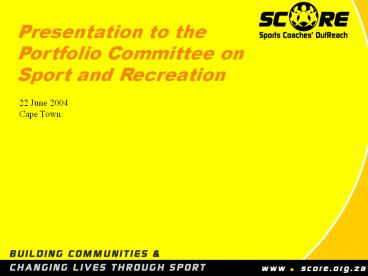22%20June%202004%20Cape%20Town
Title:
22%20June%202004%20Cape%20Town
Description:
Good success in sports such as Handball, Gymnastics, Girls Football, Basketball, Volleyball. ... Current split is 63% African,37% non-African (Jan-Jun 2004) ... –
Number of Views:38
Avg rating:3.0/5.0
Title: 22%20June%202004%20Cape%20Town
1
Presentation to the Portfolio Committee on Sport
and Recreation
22 June 2004Cape Town
2
Introduction
- Last presentation on 27 January 2004.
- Detailed overview of SCORE
- Progress Report on
- Key Results Achieved
- Project Highlights
- Key Challenges Faced
3
Objectives
- Build strong, healthy communities.
4
Objectives
Give children a chanceto play and learn.
5
Objectives
Provide NEW sportsopportunities.
6
Objectives
Promote Equity, Friendship, Fairplay andExchange
through Sport.
7
Objectives
Develop partnerships.
8
Objectives
Train trainers and develop community leadership
capacity.
9
Objectives
Promote voluntarism.
10
What do we do?
- Develop and Train Community members in sports,
sports administration and life skills. - Build sustainable sports structures in
communities - Add capacity to the work of other partners e.g.
National and Provincial government. - Recruit, train, prepare and place volunteers in
communities. - Monitor and evaluate programs in communities
11
How do we do it?
- Involve target communities in all stages of
programme implementation. - Stakeholder consultation.
- Public meetings.
- Community action plan.
- Implementation by local sport structures.
- Quality training.
- Added capacity by volunteers.
12
12
Key result areas.
- Community Capacity Building.
- Sports Development.
- Physical Education
- Infrastructure Development.
- Gender Equity
- Volunteerism.
13
1. Community Capacity Building
- (Results 2000-2003)
- Established 45 local sports councils.
- Conducted 120 sports leader courses, 1475
trainees. - 93 sports admin courses, 800 trainees.
- Introduced new sports codes in numerous
communities. - Facility ownership and management
- Introduced life skills courses
14
1. Community Capacity Building
- Economic Factors
- Skills development
- Investment in community assets e.g. facility,
equipment. - Job creation
- Network of opportunity
- Income generation opportunities for community
- Income for volunteer
15
2. Sports Development
- Introduced in excess of 20 different sports.
- Good success in sports such as Handball,
Gymnastics, Girls Football, Basketball,
Volleyball.
16
2. Sports Development
- Approximately 250 local tournaments, /- 17 000
participants. - 45 female participation.
- 251 sports specific and general workshops, 9 781
participants, 35 female participation.
17
3. Physical Education
- On average 35 000 to 40 000 learners per week,
approximately 48 females. - Work in about 140 schools
- PE Workshops
18
4. Infrastructure Development
- Built 36 facilities.
- Expertise in facility development, contracted to
build 9 netball courts (5 completed). - Trained facility management committees.
- Created approximately 20 local jobs per
facility. - Total value of facilities approximately R20
million.
19
5. Gender Equity
- 250 girls in sport events, 15 860 participants.
- Self Defence workshops.
- Assertiveness training.
- 61 leadership courses for women.
- 50,5 female participation at school level.
20
Volunteers
- Approximately 600 volunteers from 23 countries.
- Current split is 63 African,37 non-African
(Jan-Jun 2004). - Well developed recruitment, orientation,
evaluation and support system.
21
Volunteers
- Youth Sports Exchange Innovative volunteer
exchange between - Norway
- Zambia
- Zimbabwe
- South Africa
- Namibia
- (Co-Ordinated by SCORE in Africa)
22
Current Donors Funding
- Norwegian Olympic Committee Confederation of
Sport - UK Sport
- Commonwealth Games Canada
- European Union
- Royal Netherlands Embassy
- Terre des Hommes
- Sport Recreation South Africa
- Provincial Governments North West, Northern
Cape Mpumalanga Eastern Cape (offices) - Individuals
- Small foundations
23
Projects Partners
- Integrated Community Sports Project (EU)
Limpopo, Mpumalanga, E. Cape, W. Cape. - Living Sport (Kicking Aids Out Network)
- Building Capacity for Sport and Recreation
(SRSA) national - Developing Sport through Volunteerism and
Capacity Building (North West) - Sports Volunteers (Northern Cape)
- Youth Sports Exchange Program (YSEP)
- Youth Leads (SA Volunteers to Denmark)
24
SCOREThe Future?
25
Strengths
- Experience Expertise
- Tangible, Sustainable Results
- Rural focus
- Sport as a tool for development
- International Presence Network
26
Weaknesses
- Currently (Foreign) Donor dependent
- No corporate sponsors
- SA network not as strong as it should be (eg.
Federations) - NGOs still seen by some as a threat rather than
as partners
27
Threats
- Donors withdrawing from South Africa
- Short term funding for projects only impacts
potential for sustainability - Reluctance by donors and funders to support
(necessary) infrastructure management costs - Donor funding increasingly goes to government and
not directly to civil society - Competition from wealthy northern NGOs
28
Opportunities
- Income generation accredited training,
facilities building consultancy, volunteer
training - Expansion in the Zone, sharing building
capacity - Lobby donors prioritise sport seek additional
funding - Lobby for role of sport on development agenda
- New, more effective partnerships eg. with
government at different levels as well as
federations
29
Conclusion
SCORE is in transition. We remain committed to
transforming lives through sport in both
communities we have worked in, as well as the
countless other communities throughout Southern
Africa that are in dire need of our services. We
welcome this opportunity to interact and network
with government at this and all levels. WE
THANK YOU !!!











![Division%20of%20Revenue%20Bill%202004%20[B4-2004]](https://s3.amazonaws.com/images.powershow.com/7396371.th0.jpg?_=201901201211)



















